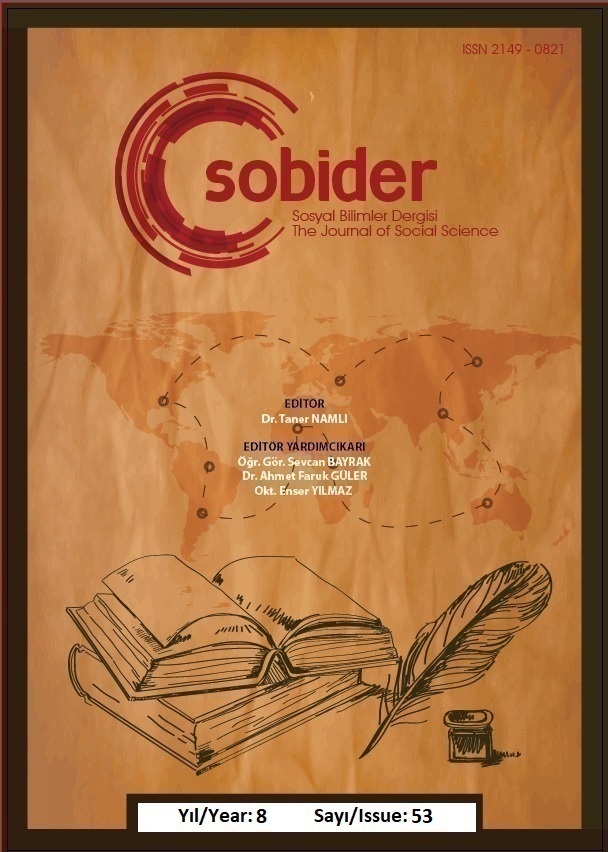Author :
Abstract
Modern devlet düşüncesinin özünde, haklarının korunması karşılığında belirli türden bir güce tüm yetkiyi devreden yurttaş ile bu yetkiyi devralan iktidar arasında karşılıklı bir ilişki vardır. Modern bir devlet, haklarını devreden halkın iradesini temsil ettiği ölçüde meşru sayılır. Bir üst siyasi otorite olarak iktidar güce hükmeder ve zor kullanma hakkını tekelinde tutarak onu paylaşmaz. İktidar ve bu iktidara tabi olan halk arasındaki ilişki ise genel olarak cansız bir bağlam üzerinden değerlendirilir. Ancak Foucault ne türden olursa olsun iktidar ilişkilerinin bu şekilde mekanik bir karşılıklılık üzerinden çözümlenemeyeceği düşüncesindedir. İktidar ona göre artık belirli bir yerde değil her yerdedir. İktidar anlayışına yönelik biyopolitik söylem geleneksel olana eklenen, onu tamamlayan bir tavır değil özünün değişimine yönelik bir çözümlemedir. Bu bakımdan teknik bir ilişkiden ziyade hayatın kendisini ve yaşamı temel alır. Bu çalışma iktidarın doğrudan maruz kalınan bir şey olmadığına, insan yaşamının pek çok katmanda iktidar ilişkilerine dahil edildiği düşüncesine odaklanmıştır.
Keywords
Abstract
In the essence of modern state idea, there is a mutual relationship between a citizen who has assigned all authority to a certain power in return to its rights being protected and the power who assumes this authority. A modern state is deemed to be legitimate as long as it represents the will of the people who has assigned the authority. As a superior political authority, a government commands power and monopolises the use of force and does not share it. The relation between the government and the people who are subjects to the government is usually interpreted over a non-living context. However, Foucault believes that power relations, regardless of the type, cannot be construed over such a mechanical mutuality. According to him, power is now not in a certain place but rather everywhere. A bio-political discourse towards the understanding of power is not an attitude that is attached to the traditional one or that supplements it, but it is rather an analysis towards the change of its essence. In this sense, it is not based on a technical relation but it is rather based on life itself. This study focuses on the notion that power is not something that one is subjected to directly but human life is being incorporated into power-relations in many different layers.
Keywords
- Ağaoğulları, M. A. ve Köker, L. (1997). Tanrı Devletinden Kral Devlete, Ankara: İmge Kitabevi.
- Ağaoğulları, M.A., Ç. Z. Filiz ve Ergün, R. (2005). Kral Devletten Ulus Devlete, Ankara: İmge Yayınları.
- Akal, C. B. (2011) Devlet Kuramı, Der. C.B. Akal, Ankara, Dost Yayınları
- Atayman V. (2005) Aydınlanma, İstanbul, Donkişot yayınları
- Bodin, J. (2009). Devlet Üzerine Altı Kitap (Özankaya, Ö. Çev.) Batı’da Siyasal Düşünceler Tarihi Seçilmiş Yazılar, Yeni Çağ, Der. Mete Tunçay, İstanbul, İstanbul Bilgi Üniversitesi Yayınları, 2009)
- Foucault, M. (2001) Kelimeler ve Şeyler (M.A.KIlıçbay, Çev.) Ankara: İmge Yayınevi
- Foucault, M. (2003) Cinselliğin Tarihi ( H. U. Tanrıöver, Çev.) İstanbul: Ayrıntı Yayınları
- Foucault, M. (2011) Özne ve İktidar (I. Ergüden, O. Akınhay, Çev.) İstanbul: Ayrıntı Yayınları
- Foucault, M. (2013) Toplumu Savunmak Gerekir, (Ş.Aktaş, Çev.) İstanbul: Yapı Kredi
- Foucault, M. (2013a) Hapishanenin Doğuşu, (M.A. Kılıçbay, Çev.) Ankara, İmge Kitabevi.
- Foucault, M (2019) İktidarın Gözü, (I. Ergüden, O. Akınhay, Çev.) İstanbul Ayrıntı Yayınları.
- Guttıng, G (2010) Foucault (H. Gür, Çev.) Ankara: Dost Yayınları
- Hobbes, T. ( 2014) Yurttaşlık Felsefesinin Temelleri, (C.D. Zarakolu. Çev), İstanbul, Belge
- Hobbes, T. (2004). Leviathan, (S. Lim Çev.), İstanbul: Yapı Kredi Yayınları.
- Lemke, T. (2013) Biyopolitika (U. Özmakas, Çev.) İstanbul, İletişim Yayınları.
- Pierson, C. (2011) Modern Devlet, (N. Kutluğ, B. Erdoğan, Çev.) İstanbul: Çiviyazıları Yayınevi
- Rousseau, J.J (1969). Toplum Sözleşmesi, (V. Günyol, Çev.) İstanbul: Çan Yayınları.
- Schmitt, C. (2006). Siyasal Kavramı, (E. Göztepe, Çev.) İstanbul: Metis Yayınları.
- Schmitt, C. (2010). Siyasi İlahiyat: Egemenlik Kuramı Üzerine Dört Bölüm, (A. E. Zeybekoğlu, Çev.) Ankara: Dost Kitabevi Yayınları.
